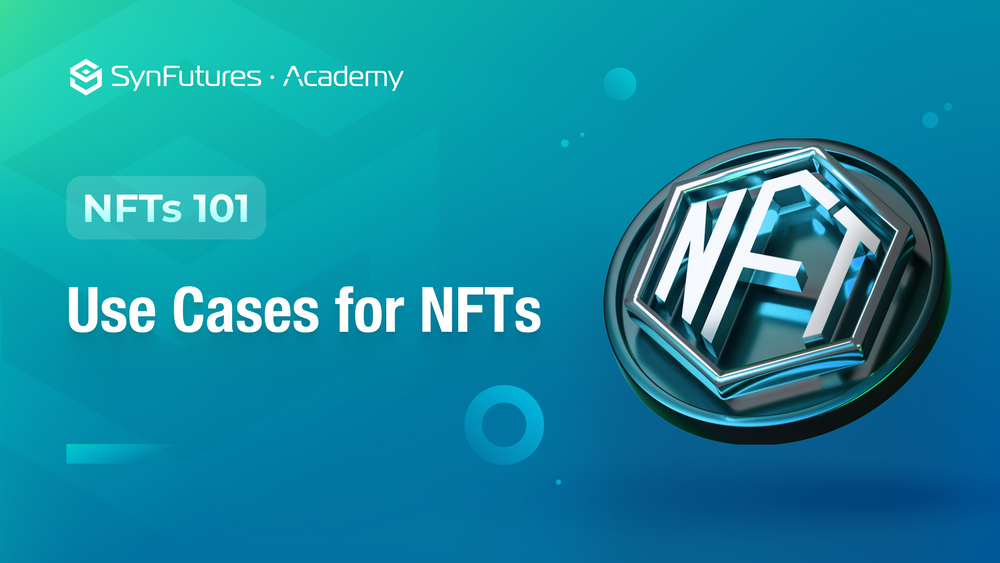Real-World Use Cases for NFTs
Key Takeaways
- NFTs are non-fungible digital assets based on a blockchain.
- Currently, NFTs are mostly art based, but they have the potential to completely change several established industries.
- NFT integration has the power to bring about a complete transformation to the music, gaming, ticketing industries, and digital identity platforms.
What are NFTs?
NFTs, or non-fungible tokens, refer to digital assets based on a blockchain, making them decentralized and censorship-resistant. Unlike cryptocurrencies, NFTs are unique digital assets representing ownership over a specific item. Since NFTs are built on blockchains, everyone can publicly track ownership. This makes them valuable to collectors who want to show off their ownership over a rare piece of a digital asset. Normally, we only see NFTs as digital art, but it can be anything: an art item, a video clip, a music album, or even a tweet.
Benefits of NFTs
NFTs have the potential to revolutionize several industries. They can allow artists to monetize their work directly without the need for a third party. They can help prevent fraud and fakes by providing proof of ownership rights from the point of creation. They can bring down the barrier to owning a digital asset, as a user would only need an internet connection and a crypto wallet to hold a million-dollar NFT safely and securely. All these advantages make NFTs an ideal tool of choice for several industries. Let’s look at some of them below.
Real-World Use Cases
Digital Art: When we think of NFTs, this is the first use case that comes to mind because this is where NFTs got introduced to the world. From BAYC to CryptoPunks, digital art NFTs have sold for millions of dollars, cornering investment from speculators, investors and collectors alike. The advent of NFTs completely transformed the digital art world and even attracted world-famous artists like Banksy who sold his NFT collection for over $15 million. Banksy’s NFT was divided into 10,000 unique squares each selling for around $1,500 which made it accessible for people who would otherwise have not had the chance to own his work.
Music: One of the biggest challenges that most budding artists face is finding the right label to publish their music and negotiating a favorable term for themselves. NFTs can solve that problem by cutting out the middleman allowing the artists to directly sell their music and create a direct revenue stream between themselves and the listeners.
Sports Collectibles: According to a recent report, sports memorabilia had a total market size of $26 billion in 2021 and is expected to reach $227 billion by 2032. Currently, this market is dominated by physical items but that is expected to change quickly with the advent of sports collectible NFTs. Several major organizations have already announced their NFTs. Some of the famous ones are the NBA TopShot, MLB Champions, Cristiano Ronaldo Binance NFTs, and many more are on their way. NFTs provide an easy-to-own and easy-to-trade option for sports fans who would like to connect with their team and own a part of its history.
Gaming: Gamers spend billions of dollars each year buying virtual items that they don’t own. Vitalik Buterin once said he decided to work on the blockchain after ‘World of Warcraft’ downgraded some of the items he owned in-game. This happened because Vitalik and other World of Warcraft players have no control over the fate of the items that they own, that control remains with the game company that owns the game. NFTs and blockchain games could change that by transferring the power to gamers. Imagine having the ability to take the item you bought or earned in one game and transfer it to another game that supports it. This can not only provide more power to gamers but also revolutionize the gaming industry.
Virtual Fashion: As the metaverse becomes more mainstream, virtual fashion is likely to become a far bigger sector in the fashion industry. Both established brands and new designers can use NFTs to launch their designs on the metaverse and the NFTs can be structured in such a way that the designers not only earn from the initial sale but also earn royalties from all the subsequent sales. A growing number of brands like Gucci, Ralph Lauren, Louis Vuitton, and Nike have all announced the launch of their own NFT products. This list is only going to grow further in the coming years.
Ticketing: Live event ticketing is another space that could be revolutionized by NFTs. In 2023, the projected revenue generation from event ticket sales is around $71.49 billion. Currently, most of the industry relies on either physical tickets or tickets based on Web 2.0 to meet this demand. Compared to both these options, an NFT-based ticketing system would offer benefits like increased scalability, transparency, and security, and would very likely cost less to create and manage. All these factors are the reason why several major ticketing platforms are actively considering NFT-based tickets for their users.
Digital Identity: Finally, NFTs can be used in identity management on the Web3 ecosystem. The much talked about Soulbound token is a form of non-transferable NFT that can form the basis of a person’s identity in the metaverse. It has the potential to provide secure, transparent identity verification while also preserving the person’s privacy.
Conclusion
Since starting as a by-product of the blockchain ecosystem, NFTs have evolved into a potent tool. NFT can become artwork, an in-game item, or a digital ID. It has found a wide range of use cases in the real world and can change how we interact with the digital world by providing a new level of authenticity, trust, and ownership of digital items. It’s hard to believe NFTs gained mainstream attention only in 2021. If it can achieve so much in 3 years, one can only wonder what the next ten years have in store.
Discover SynFutures' crypto derivatives products: www.synfutures.com/.
Disclaimer: SynFutures Academy does not guarantee the reliability of the site content and shall not be held liable for any errors, omissions, or inaccuracies. The opinions and views expressed in any SynFutures Academy article are solely those of the author(s) and do not reflect the opinions of SynFutures. The SynFutures Academy articles are for educational purposes or information only. SynFutures Academy has no relationship to the projects mentioned in the articles, and there is no endorsement for these projects. The information provided on the site does not constitute an endorsement of any of the products and services discussed or investment, financial, or trading advice. A qualified professional should be consulted prior to making financial decisions.




